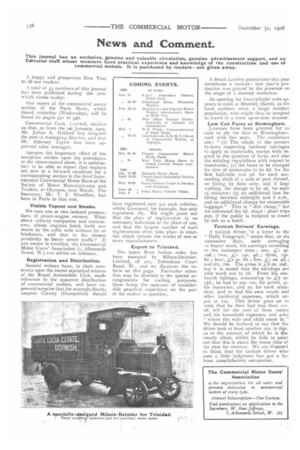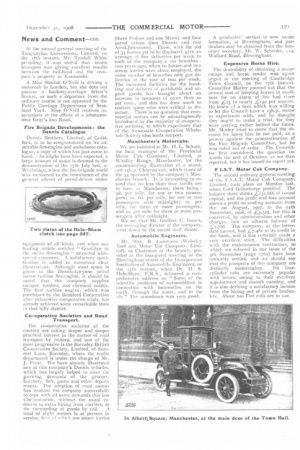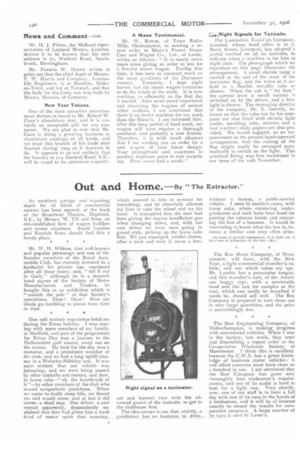News and Comment.
Page 8

Page 9

Page 10

If you've noticed an error in this article please click here to report it so we can fix it.
This journal has an exclusive, genuine and valuable circulation, genuine advertisement support, and an Editorial staff whose members have practical experience and knowledge of the construction and use of commercial motors. It is purchased by readers—not given away.
A happy and prosperous New Year to all our readers.
A total of 53 numbers of this journal has been published during the year which closes to-clay.
Our report of the commercial motor section of the Paris Show, which closed yesterday (Wednesday), will be found on pages 341 to 346.
Commercial Cars, Limited, notifies us that, as from the 1st January, 1909. Mr. Julian A, Halford has resigned the post of managing director, and that Mr. Aldersey Taylor has been appointed sales manager.
Apropos the important effect of the aeroplane section upon the attendance at the above-named show, it is satisfactory to be able to report that matters are now in a forward condition for a corresponding section in the third International Commercial Motor Show of the Society of Motor Manufacturers and Traders, at Olympia, next March. The Secretary, Mr. T. F. Woodfine, has been in Paris to that end.
Visible Vapour and Smoke.
We note one or two isolated prosecutions of steam-wagon owners. What about railway companies and contractors, whose engines belch forth wet steam by the cubic mile without let or hindrance, and that in the closest proximity to heavy street traffic? If any owner is troubled, the Commercial Motor Users' Association (I, Albernarle Street, W.) can advise on defences.
Registration and Distribution.
Several writers have, in their comments upon the recent statistical returns of the Royal Automobile Club, made reference to the apparent distribution of commercial motors, and have expressed surprise that,for example,Southampton County (Hampshire) should have registered over 500 such vehicles, whilst Liverpool, for example, has only registered 185. We might point out that the place of registration is no necessary indication of the place of use, and that the largest number of such registrations often take place in counties which include the works of one or more manufacturers.
Export to Trinidad.
The latest West Indian order has been executed by Milnes-Daimler, Limited, of 221, Tottenham Court Road, W., and we illustrate the vehicle on this page. Particular attention may be directed to the special arrangements for cooling purposes, these being the outcome of considerable practical experience on the part of the maker in question.
A South London pantomime this year introduces a taxicab : last year's production was graced by the presence on the stage of a dummy motorbus.
An opening for four-cylinder cabs appears to exist at Bromley (Kent), as the local stations serve a large resident population, who might thus be tempted to travel in a more up-to-date manner.
Low Cab Fares at Birmingham.
Licenses have been granted for 20 cabs to ply for hire in Birmingham, each with five seats. The conditions are : " (1) The whole of the present by-laws respecting hackney carriages to apply to motorcabs, except with regard to the question of fares, and also the existing regulations with respect to motorcabs; (2) the fares to be charged for hire of motorcabs to be 6d. for the first half-mile and 2d. for each succeeding sixth of a mile or part thereof, no hiring by time only, and if kept waiting, the charge to be 2d. for each 2A minutes; (3) no additional fare for hiring between midnight and 6 a.m., and no additional charge for reasonable luggage." This is " dirt cheap," but we commend the 6d. stage : short trips pay, if the public is tempted to travel by cab as a habit.
Taxicab Drivers' Earnings.
A taxicab driver, in a letter to the " Daily Telegraph," states that, on six successive days, each averaging F2 hours' work, his earnings according to the taximeter were : one, Li gs. rod.; two, Zi 14s. 4d.; three, /5s. 8d.; four, ‘2 45. Rd.; five, .4.1 os. 4d.;
and six, 16s. The gross is os.
but it is stated that the earnings per mile work out to 7d. From his onefourth takings, amounting to L os. zid., he had to pay 12s. for petrol, 3s. for insurance, and 25. for rank attendant, and to find his own meals and other incidental expenses, which are put at I25. This driver goes on to state that he then had less than us. 6d. left for the rent of three rooms and his household expenses, and asks " where the wife and child come in." We should be inclined to say that the driver took at least another zos. in tips, as to the amount of which he is discreetly silent, whilst he fails to point out that this is about the worst time of the year for revenue. We are disposed to think that the taxicab driver who uses a little judgment has got a far from unsatisfactory occupation.
At the annual general meeting of the Tanganyika Concessions, Limited, on the 18th instant, Mr. Tyndall White presiding, it was stated that steam transport was giving excellent results between the rail-head and the company's property at Kansanshi.
A Miss Sheilah O'Neill is driving a motor-cab in London, but she does not possess a hackney-carriage driver's license, as such a departure from the ordinary course is not approved by the Public Carriage Department of Scotland Yard. Miss O'Neill receives instructions at the offices of a jobmaster near Gray's Inn Road.
Fire Brigade Developments : the Dennis Catalogue.
Dennis Brothers, Limited, of Guildford, is to be congratulated On its admirable fire-engine and ambulance catalogue, a copy of which has just come to hand. As might have been expected, a large amount of space is devoted to the demonstration of the a7th July last, at Weybridg-e, when the fire-brigade world a as awakened to the imminence of the general advent of petrol-driven motor equipment of all kinds, and when our leading article entitled " Good-bye to the steam fire-engine " attracted widespread comment. A satisfactory specification is added to numerous clear illustrations. Although most space is given I o the Dennis-Gwynne petrol motor turbine fire-engine, it should be noted that the company supplies escapes, tenders, and chemical outfits. The first turbine engine, which was purchased by the Bradford Corporation after exhaustive comparative trials, has already achieved some remarkable feats in that hilly district.
Co-,operative Societies and Road Transport.
The co-operative societies of the country are taking deeper and deeper practical interest in the matter of road transport by motors, and one of the most progressive is the Barnsky British Co-operative Society, Limited, of Summer Lane, Barnsley, where the traffic department is under the charge of Mr. J. Frost. We have already illustrated one of this company's Dennis vehicles, which has largely helped to meet the growing demands of the grocery, butchery, fish, game and other departments. The adoption of road motors has enabled the company successfully to cope with all extra demands this last Christmastide, without the usual recourse to extra hiring from carriers, or the forwarding of goods by rail. A total of eight motors is at present in service, foar of which are steam lorries
(three Fodens and one Mann), and four petrol driven (two Dennis and two Arrol-Johnstons). These, with the aid of 33 horses yet to be displaced, give an average of five deliveries per week to each of the company's to2 branches : two years ago, when 6o horses and two steam lorries were alone employed, the same number of branches only got deliveries at the rate of two per week. The increased facilities for the handling and delivery of perishable and urgent goods has brought about an increase in turnover of more than 2o per cent., and this has done much to convert some who were critical at the outset. There is no question that commercial motors can be advantageously introduced by the majority of co-operative societies, to which experience that of the Newcastle Co-operative Wholesale Society also lends support.
Manchester's Motoreabs.
We are indebted to Mr. H. L. Schute, the local manager of the Provincial Motor Cab Company, Limited, at Whalley Range, Manchester, for the accompanying illustration of a standard 1511.p. Charron cab, which is one of the 35 operated by the company's Manchester branch. It is interesting to record that no less than four tariffs are in force at Manchester, these being : yd. per mile, for one or two passengers; ts. 6d. per mile, for one or two passengers after midnight; is. per mile, for three or more passengers; and 2s. per mile for three or more passengers after midnight.
We see that Mr. Godfrey C. Isaacs, the managing director of the company, went down to the recent staff dinner.
Automobile Engineers.
Mr. Max. R. Lawrence (Wolseley Tool and Motor Car Company, Limited), as Chairman of the branch, presided at the inaugural meeting of the Birmingham centre of the Incorporated Institution of Automobile Engineers, on the,. 15th instant, when Dr. H. S. Ilele-Shaw, F.R.S., delivered a comprehensive address on "Some of the scientific problems of automobilism in connection with locomotion on the earth, through the water, and in the air." The attendance was very good. A graduates' section is now under formation, at Birmingham, and particulars may be obtained from the honorary secretary, Mr. W. Schenke, lig,. Walford Road, Birmingham, Expensive Horse Hire.
The desirability of obtaining a motor escape and horse tender was again. urged at the meeting of Cambridge Town Council, on the 17th instant. Councillor Morley pointed out that the annual cost of keeping horses in readiness for an alarm of fire had risen from Z15 to nearly £150 per annum. He knew of a firm which was willing to let the Council have a r5h.p. motor to experiment with, and he thought they ought to make a trial, for they were getting rather behind the times. Mr. Morley tried to move that the account for horse hire be not paid, as a protest against the procrastination of the Fire Brigade Committee, but he was ruled out of order. The Committee first considered the question towards the end of October, as we then reported, but it has issued no report yet.
F I.A.T. Motor Cab Company.
The second ordinary general meeting of the F.I.A.T. Motor Cab Company, Limited, took place on Monday last, when Lord Grimthorpe presided. The balance sheet shows £131,666 of issued capital, and the profit and loss account shows a profit on trading account, from the 1st August, 1907, to the 24th November, 1908, of £3,325, but this is converted, by administration and other charges, into an adverse balance of £3,766. The company, at the latterdate named, had £7,481 to its credit in the bank, and it has certainty made a very excellent start. The difficulties with the maintenance contractors, to which we referred in our issue of the 5th November (page 176a) have been amicably settled, and we should say that the prospects of this company are distinctly encouraging. Its fourcylinder cabs are extremely popular with hirers, owing to their excellent appointment and smooth running, and it is also deriving a satisfactory income from the hiring out of private landaulets. About 200 Fiat cabs are in use. Mr_ H. J. Fitton, the Midland representative of Leyland Motors, Limited, desires it to be known that his new address is 71, Watford Road, Sparkbrook, Birmingham.
Mr. Francis W. Harris writes to point out that the chief depot of Messrs. F. W. Harris and Company, Automobile Engineers, is at Burslem, Stokeon-Trent, and not at Tunstall, and that the body for his Lotis van was built by Messrs. Hewers, of Coventry.
New Year Tokens.
One of the most attractive advertisement devices is found in Mr. Robert W. Coan's aluminium tray, and it is certainly an acceptable gift for any customer. We are glad to note that Mr. Coan is doing a growing business in aluminium castings of all kinds, and we trust this branch of his trade may flourish during 1909 as it deserves to do. It appears to us not unlikely that the foundry at 219, Goswell Road, E.C., will be taxed to its uttermost capacity. A Mann Testimonial.
Mr. W. Rowse, of Town Roller Mills, Okehampton, in sending a repeat order to Mann's Patent Steam Cart and Wagon Co., Ltd., of Leeds, writes as follows : " It is nearly seven years since giving an order to you for a five-ton steam wagon. During that time, it has been in constant work on the steep gradients of the Dartmoor country. Formerly, I kept eight horses, but the steam wagon continues to do the whole of the work. It is now working as efficiently as the first day it started, After seven years' experience and observing the wagons of several other makers, I am convinced that there is no better machine for my work than the Mann's. I am informed that, after this long period of hard work, my wagon will soon require a thorough overhaul, and probably a new firebox. Therefore, it is with much pleasure that I am sending you an order for a new wagon of your latest design. Your promptitude and exactness in sending duplicate parts is very surprising. Have never had a misfit." Night Signals for Taxicabs.
The Lancashire Taxi-Cab Company, Limited, whose head office is at 7. Berry Street, Liverpool, has adapted a useful method on all its taxicabs, to indicate when a machine is for hire at night time. The photograph which we reproduce on this page illustrates the arrangement. A small electric lamp is carried at the end of the mast of the taximeter flag, and the wires to it are held in a flexible metallic tube as shown. When the cab is " for hire the current from a small battery is switched on by the driver, and a blue light is shown. The managing director ot the company, Mr. E. Gormly, informs us that the cabs run by his company are also fitted with electric light inside, speaking tube, mirrors and a foot warmer ; daily papers are also provided. We would suggest, as an improvement on the present hand-operated arrangement, that the raising of the flag might easily be arranged automatically to switch on the light. This practical fitting was first mentioned in our issue of the 19th November.






















